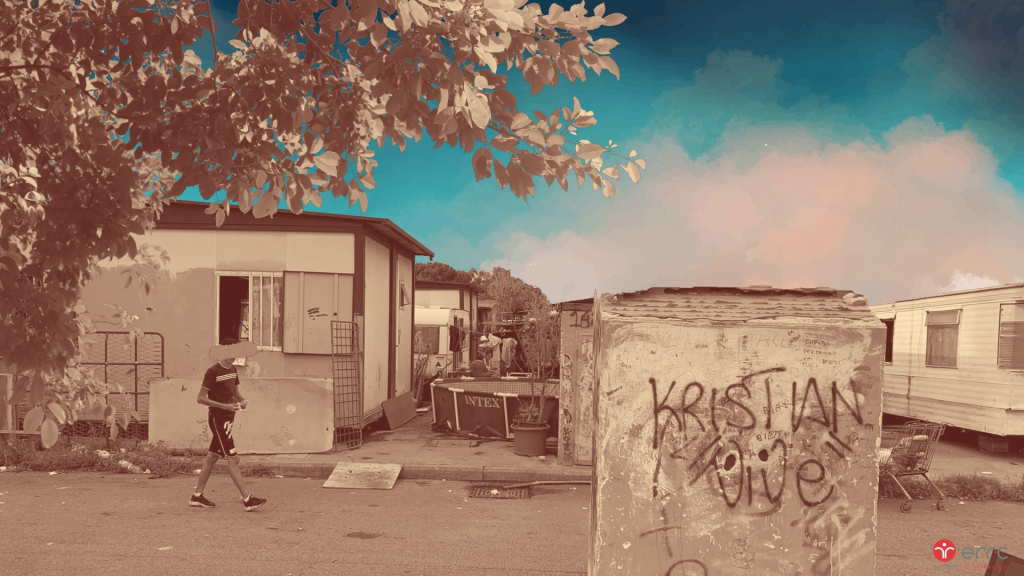Italy found guilty of violating European Social Charter over anti-Roma discrimination in housing
17 May 2024

The latest decision by the Council of Europe against Italy confirms what Amnesty International, the ERRC, and Associazione 21 luglio have been saying for over a decade – that Italy’s policies over the housing situation of Roma amount to racist discrimination, run counter to the state’s obligations under international law, and should be considered a fundamental breach of Europe’s Race Equality Directive.
But will Italy heed this latest verdict? Based on its track record to date, and as long as Giorgia Meloni’s coalition of ‘post-fascists’ remain in power, hopes for a brand-new day beyond discrimination remain slim. This decision from Strasbourg is at odds with the stance taken by Brussels, where the European Commission has repeatedly given Italy a pass when it comes to anti-Roma racism. So, what will the Commission do or say in light of this damning verdict? Not a lot would be a safe wager in the current context.
In a unanimous decision on 13 May 2024, the Council of Europe’s European Committee of Social Rights (ECSR) concluded that Italy’s persistent discriminatory mistreatment of Roma in its housing policies amounts to serious violations of the European Social Charter. The decision was in response to a complaint filed by Amnesty International on 18 March 2019. The Committee concluded that Italy had violated Article E of the Charter as regards the continuation of forced evictions of Roma, segregated and sub-standard housing, and concerning the lack of equal access to social housing for Roma.
On forced evictions
The Committee considers that racial discrimination is a particularly invidious kind of discrimination that requires special vigilance and a vigorous reaction from the authorities. Noting that forced evictions which directly target Roma have continued since its 2004 decision on the collective complaint ERRC v. Italy, and to this day remain a current practice, the Committee considers that the ongoing housing conditions of Roma and Sinti living in camps constitutes discrimination:
“The State has failed to adopt a comprehensive and adequate legal framework allowing to ensure sufficient remedies in cases of forced evictions. Moreover, as a result of these practices, Roma and Sinti are largely stigmatised and remain marginalised, which constitutes discriminatory treatment.”
Segregated and sub-standard housing
The Committee referred to previous findings, reports and collective complaints which revealed patterns of housing segregation and anti-Roma discrimination, with huge amounts of public money spent on Roma camps which exacerbate exclusion. Despite some patchy and localised progress, the Committee noted there remains no coherent national approach towards inclusion, that interventions are mainly of an ‘emergency’ character, and that the State has failed to provide a long-term solution to segregation in housing of Roma and Sinti.
In light of the evidence “the Committee considers that a large number of Roma families still live in substandard and segregated housing in Italy, and holds therefore, that there is a violation of Article E read in conjunction with Article 31§1 of the Charter.”
Lack of equal access to social housing
The information provided by the authorities about the allocation of resources to specific projects to improve access to social housing for Roma, failed to impress the Committee that such resources have effectively and significantly improved access of Roma and Sinti to social housing without discrimination. “The Committee holds therefore that the situation of segregation of Roma and Sinti in camps and the lack of equal access to social housing constitute a violation of Article E read in conjunction with Article 31§3 of the Charter.”
Commission complicity and the sound of silence
For its part, the European Commission has long chosen to remain silent in the face of mounting and overwhelming evidence of systemic anti-Roma discrimination, forced evictions and camp segregation. In 2008 the Commission gave its blessing to the scheme to fingerprint Roma children in the camps, and found nothing amiss about the illegal ‘nomad state of emergency’ declared by Silvio Berlusconi. In the years that followed, the Commission took no action against Italy despite mounting evidence that Roma faced extreme harassment that violated personal dignity, and that the conditions in segregated camps and emergency shelters constituted what the Race Equality Directive describes as “an intimidating, hostile, and degrading environment.”
On 6 April 2017, The Financial Times reported that the European Commission had repeatedly blocked publication of a report which recommended sanctions against Italy for discrimination in housing and mistreatment of its Roma minority, in an attempt to avoid a damaging public row.
The case against Italy was for violating the Racial Equality Directive through discrimination against Roma in provision of housing. In 2019, the Commission closed its dossier on an infringement procedure altogether. This decision was based on the argument that forced evictions are not covered in the scope of the directive, and the belief that the Italian government is no longer directing Roma towards segregated government camps. The evidence to the contrary was, and remained, overwhelming. The Commission just kept schtum.
In normal times, this latest ECSR decision concerning Italy’s serious violations of the European Social Charter would merit a response from the European Commission. But don’t expect much in these far from normal times, especially as the EU gears itself up for June elections that are likely to result in an expanded right-wing bloc in the European Parliament.
Giorgia Meloni has, since her election victory, become an unlikely but formidable power player in EU politics, and Commission head Ursula von der Leyen’s assiduous courting of Meloni has hardly gone unnoticed in recent months. As one commentator put it, “Polls show a major surge of right-wing parties in the EU, and von der Leyen sees Meloni as a solid ally in her bid for re-election.” As we witness the unlovely convergence of the interests of a neo-liberal rightist from Germany with her post-fascist counterpart in Italy, it’s a sobering certainty that the European Social Charter matters for little, and that Roma inclusion counts for less than zero in their political calculations.




